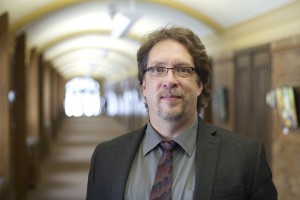 Dr. Delmar Epp, Associate Professor of Psychology, has taught at CMU since 2000.
Dr. Delmar Epp, Associate Professor of Psychology, has taught at CMU since 2000.
What are you teaching right now that you’re most excited about?
Two courses come to mind. One is Psychology of Motivation, which explores the underlying needs that drive a lot of our everyday behaviour. That course comes closest to my own research interests. The other course is The Neuroscience of Social Behaviour, which describes the interactions between our behaviours and brain activity in the course of everyday life. This is really where the cutting edge in my discipline is, and it’s just absolutely fascinating to explore.
What are you researching and writing?
I’ve been working for a number of years at projects having to do with self-protection. My argument is that whenever we feel discomfort or feel threatened, or we feel that we are somehow at risk, we act in ways to preserve and protect things that are important to ourselves—our self-image, our self-esteem, our reputation, or more tangible things we think we’re at risk of losing. One of the outcomes of that motive to self-protect is that when we feel that we’re at risk, we tend to draw away from people who might represent that threat—people who are sometimes different than we are. I’ve been looking at this in various contexts.
What you are reading for enjoyment?
I’ve just begun a book called Hillbilly Elegy by J.D. Vance. It describes his experience growing up in what is sometimes referred to as the decaying heartland of America—the sense of hopelessness, the sense of risk and loss that many folks experience in that environment, and what this does in terms of their social attitudes and their relationships with other groups of people. I also recently finished a book of stories by Robert Louis Stevenson.
What do you most long for in your work?
For people to appreciate that a psychological understanding of themselves and their interactions with others can be a real benefit in terms of how we relate to one another, how we appreciate one another, and how we understand what others are experiencing. Additionally, I want my students in particular to know that a psychological/scientific understanding is not incompatible with an understanding of ourselves from a Christian perspective. They can complement and enhance one another. I want to emphasize that holistic view.
Do you have any interesting projects underway in the broader community or church?
The third iteration of the Great CMU Psychological Health Survey is about to get underway. It’s something we started back in 2013 in response to some published reports of significant psychological health concerns at larger Canadian universities. We wondered whether we might see similar sorts of issues on a much smaller campus like CMU, particularly one where we invest significantly in ensuring the connectedness and wellbeing of our students through our Student Life program and various other activites. Overall, what we’ve found thus far is encouraging.
What saying or motto inspires you?
The French poet and philosopher Paul Valéry said, “The purpose of psychology is to give us a completely different idea of the things we know best.” That idea inspires the work that I do. I’m always fascinated with the fact that we’re learning more and more about how we ought to understand ourselves.
